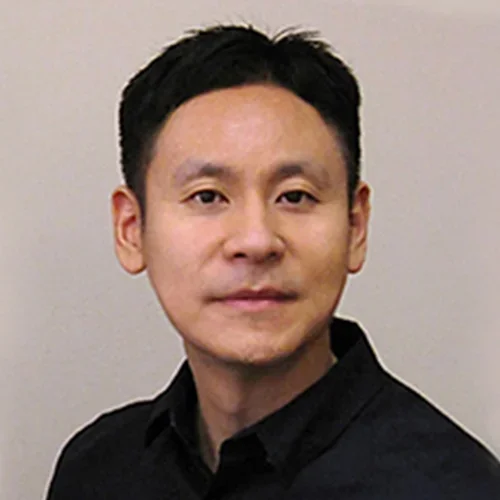
Min Lee, Ph.D.
Professor
23-088F
UCLA School of Dentistry
10833 Le Conte Ave
Los Angeles, CA 90095-1668
About
Min Lee, Ph.D. is a Professor in the Section of Biosystems and Function in the Division of Oral and Systemic Health Sciences at the UCLA School of Dentistry. His primary research area is to design and develop new biomaterial systems to provide fundamental bases and translational approaches to tissue engineering and regenerative medicine, particularly focusing on orthobiologics, material-based therapeutics to repair craniofacial and orthopedic skeletal defects, novel liposomal platform for drug and gene delivery, photopolymerizable hydrogel systems.
Additional Information
Courses taught at UCLA:
- RFE102, Dental Materials (Course Chair)
- RFE400, Advanced Materials and Biomechanics (Course Chair)
- RFE104, Direct Restoration (Guest Lecturer)
- RFE202, Direct Restoration (Guest Lecturer)
- RFE207, Direct Restoration (Guest Lecturer)
Research & Interests
Material-based therapy to repair craniofacial defects
New biomolecular strategy to regulate adipo-osteogenic balance
Nanomaterials for drug and gene delivery
Exosome-based nanoplatform for targeted delivery
Injectable hydrogel system
Research Description:
Research in the Lee groupÊfocuses on the development of biomimetic polymer systems for tissue regeneration and drug delivery applications. His research interests are:
New therapy for bone repair
Various pathophysiologic processes of aging, obesity and osteoporosis are associated with the dysregulation of the adipo-osteogenic differentiation of mesenchymal stem cells (MSCs). Regulating the lineage commitment of MSCs has increasingly attracted great attention in recent years. We developed novel biomolecular strategies that favor osteogenesis over adipogenesis by regulating expression of tribbles proteins. Completion of this study will identify new therapies for the treatment of various bone marrow related diseases and metabolic abnormalities as well as for application of MSCs in tissue engineering.
Nanomaterials for controlled release
Therapeutic efficacy of drug molecules is affected by delivery kinetics due to their intrinsic instability and rapid degradation in the body. Sterosomes are a novel class of liposomes formed from single-chain amphiphiles and high content of sterols, and presented significantly increased stability compared to conventional phospholipid liposomes. We developed a novel sterosome formulation that exerts specific tissue targeting and intrinsic therapeutic effects even without drug loading. This system suggests a promising delivery vector for drugs and therapeutic genes.
Hydrogel carrier system
Hydrogels derived from naturally occurring polymers are attractive matrices for tissue engineering by delivering precursor/stem cells or therapeutic agents into defect sites through a minimally invasive manner. We developed a hydrogel design strategy to better guide cellular behavior and tissue formation by creating injectable and self-healing polymer network with controlled porous structures and tunable degradability. This system may serve as versatile biomaterial platform for many applications, including therapeutic delivery, cell carriers, and regenerative medicine.
Research Grants:
NIH/NIDCR R01 DE027332, Principal Investigator, 2018-2023
- Tribbles homolog 3 and BMP-2 induced bone formation
DOD W81XWH-18-1-0337, Principal Investigator, 2018-2021
- Development of smoothened agonist nonphospholipid liposomal nanoparticles for bone repair
MTF Biologics, Principal Investigator, 2018-2021
- Enhanced biological activity of demineralized bone matrix with noggin suppression in polymer matrices
NIH/NIAMS R01 AR070773, Aaron James (PI), Min Lee (PI of subcontract), 2017-2022
- Direct and indirect contributions of perivascular stem cells to bone healing
Fax: (310) 825-6345
Education and Degree(s)
- B.S., Yonsei University, Seoul, Korea, Materials Science and Engineering, 1997
- M.S., Yonsei University, Seoul, Korea, Materials Science and Engineering, 1999
- Ph.D., University of California, Los Angeles, CA, Biomedical Engineering, 2007
Publications
- Fan J, Lee CS, Kim S, Zhang X, Pi-Anfruns J, Guo M, Chen C, Rahnama M, Li J, Wu BM, Aghaloo T, Lee M.Trb3 controls mesenchymal stem cell lineage fate and enhances bone regeneration by scaffold-mediated local gene delivery. Biomaterials 264:120445, 2020.PMID: 33069136
- Lee CS, Hwang HS,Kim S, Fan J, Aghaloo T,Lee M.Inspired by nature: facile design of nanoclay-organic hydrogel bone sealant with multifunctional properties for robust bone regeneration. Advanced Functional Materials 30(43):2003717, 2020. PMCID:PMC759110
- Fan J, Lee CS, Kim S, Chen C, Aghaloo T, Lee M.Generation of small RNA-modulated exosome mimetics for bone regeneration. ACS Nano 14(9):11973-11984, 2020. PMCID:PMC7530137
- Lee CS, Kim S, Fan J, Hwang HS, Aghaloo T,Lee M.Smoothened agonist sterosome immobilized hybrid scaffold forbone regeneration. Science Advances 6(17):eaaz7822, 2020. PMCID:PMC7176430
- Zhang X, Fan J, Lee CS, Kim S, Chen C, Aghaloo T,Lee M.Apatite-binding nanoparticulate agonist of hedgehog signaling for bone repair. Advanced Functional Materials 30(12):1909218, 2020. PMCID:PMC7494204
- Cui Z, Kim S, Baljon J, Wu B, Aghaloo T, Lee M. Microporous chitosan-montmorillonite nanocomposite hydrogel for bone tissue engineering. Nature Communications 10(1):3523, 2019. PMCID:PMC6684526
Read all the publications: